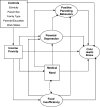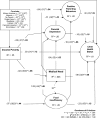Children's health status: examining the associations among income poverty, material hardship, and parental factors
- PMID: 17895981
- PMCID: PMC1978512
- DOI: 10.1371/journal.pone.0000940
Children's health status: examining the associations among income poverty, material hardship, and parental factors
Abstract
Background: We examined a model of multiple mediating pathways of income poverty, material hardship, parenting factors, and child health status to understand how material hardship and parental factors mediate the effects of poverty on child health. We hypothesized that: (a) poverty will be directly associated with material hardship, parental depression, and health status, and indirectly with parenting behaviors through its effects on parental depression and material hardship; (b) material hardship will be associated with parental depression, parenting behaviors, and health status; and (c) parental depression will be correlated with parenting behaviors, and that both parental depression and parenting behaviors will predict child health.
Methods and results: We used data from the 2002 National Survey of American Families for a sample of 9,645 6-to-11 year-olds to examine a 4-step structural equation model. The baseline model included covariates and income poverty. In the hardship model, food insufficiency and medical need were added to the baseline model. The parental model included parental depression and parenting behavior and baseline model. In the full model, all the constructs were included. First, income poverty had a direct effect on health status, and an indirect effect through its association with material hardship, parental depressive affect, and parenting behaviors. Medical need and food insufficiency had negative effects on child health, and indirect effects on health through their association with parental depression and parenting behaviors. Finally, parental depression and parenting behaviors were associated with child health, and part of the effect of parental depression on health was explained by its association with parenting behaviors.
Conclusions: Poverty has an independent effect on health, however, its effects are partially explained by material hardship, parental depression and parental behaviors. To improve children's health would require a multi-pronged approach involving income transfers, health insurance coverage, food and nutrition assistance, and parenting interventions.
Conflict of interest statement
Figures


Similar articles
-
African American and non-Hispanic white children's health: integrating alternative explanations.Ethn Health. 2008 Nov 1;13(5):375-98. doi: 10.1080/13557850801900364. Ethn Health. 2008. PMID: 18850366
-
The mediating effect of parenting stress and couple relationship quality on the association between material hardship trajectories and maternal mental health status.J Affect Disord. 2021 Jul 1;290:31-39. doi: 10.1016/j.jad.2021.04.058. Epub 2021 May 1. J Affect Disord. 2021. PMID: 33991944 Free PMC article.
-
Early Family Conflict and Behavioral Outcomes in Children from Low-Income Families: The Indirect Effects of Parental Depression and Parenting Practices.Int J Environ Res Public Health. 2024 Dec 13;21(12):1664. doi: 10.3390/ijerph21121664. Int J Environ Res Public Health. 2024. PMID: 39767503 Free PMC article.
-
Family environmental factors influencing the developing behavioral controls of food intake and childhood overweight.Pediatr Clin North Am. 2001 Aug;48(4):893-907. doi: 10.1016/s0031-3955(05)70347-3. Pediatr Clin North Am. 2001. PMID: 11494642 Review.
-
Poverty is Not Just an Indicator: The Relationship Between Income, Poverty, and Child Well-Being.Acad Pediatr. 2016 Apr;16(3 Suppl):S23-9. doi: 10.1016/j.acap.2015.12.010. Acad Pediatr. 2016. PMID: 27044698 Review.
Cited by
-
Pathways from maternal depression to child resilience: Socioeconomic, family, and individual factors in the 2004 Pelotas (Brazil) birth cohort.JCPP Adv. 2023 Oct 3;3(4):e12188. doi: 10.1002/jcv2.12188. eCollection 2023 Dec. JCPP Adv. 2023. PMID: 38054047 Free PMC article.
-
Association of Food Insecurity with Mental Health Outcomes in Parents and Children.Acad Pediatr. 2022 Sep-Oct;22(7):1105-1114. doi: 10.1016/j.acap.2022.04.010. Epub 2022 May 13. Acad Pediatr. 2022. PMID: 35577282 Free PMC article. Review.
-
Cardiovascular disease risk factors are elevated in urban minority children enrolled in head start.Child Obes. 2014 Jun;10(3):207-13. doi: 10.1089/chi.2013.0146. Epub 2014 May 14. Child Obes. 2014. PMID: 24829071 Free PMC article.
-
Addressing Social Needs in Health Care Settings: Evidence, Challenges, and Opportunities for Public Health.Annu Rev Public Health. 2021 Apr 1;42:329-344. doi: 10.1146/annurev-publhealth-090419-102204. Epub 2021 Dec 16. Annu Rev Public Health. 2021. PMID: 33326298 Free PMC article. Review.
-
"It's a lot of things": Household material hardship among Black and Hispanic parents of children with cancer.Pediatr Blood Cancer. 2023 Jun 13:e30485. doi: 10.1002/pbc.30485. Online ahead of print. Pediatr Blood Cancer. 2023. PMID: 37312643 Free PMC article.
References
-
- Hughes DC, Ng S. Reducing health disparities among children. The Future of Children. 2003;13(1):153–167. - PubMed
-
- Case A, Lubotsky D, Paxson C. Economics status and health in childhood: The origins of the gradient. NBER Working Paper #8344. Cambridge, MA: National Bureau of Economic Research; 2001. - PubMed
-
- Smith JP. Socioeconomic status and health. Am Econ Rev. 1998;88:192–196.
-
- Beverly SG. Material hardship in the United States: Evidence from the Survey of Income and Program Participation. Soc Work Res. 2001;25:143–151.
-
- Boushey H, Brocht C, Gundersen B, Bernstein J. Hardships in America: The real story of working families. Washington, DC: Economic Policy Institute; 2001.
MeSH terms
LinkOut - more resources
Full Text Sources
Medical

